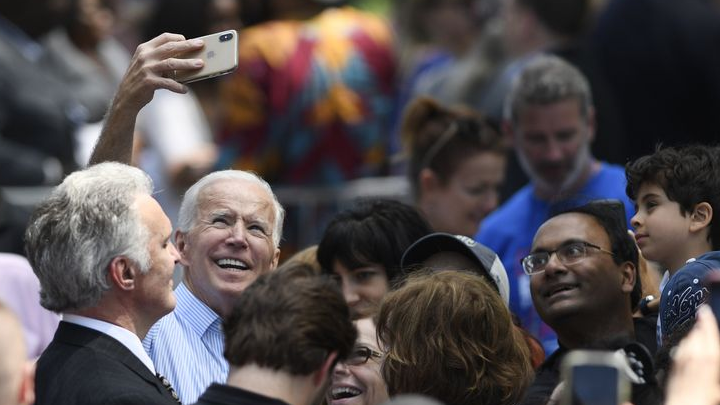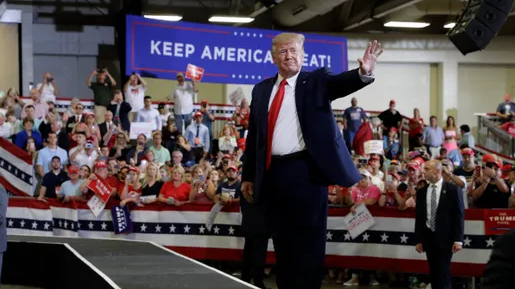
Former U.S. Vice President Joe Biden takes selfie with supporters during a rally in Philadelphia, the United States, May 18, 2019. /Xinhua
Former U.S. Vice President Joe Biden takes selfie with supporters during a rally in Philadelphia, the United States, May 18, 2019. /Xinhua
Editor's note: Tom Fowdy is a British political and international relations analyst and a graduate of Durham and Oxford universities. He writes on topics pertaining to China, the DPRK, Britain and the U.S. The article reflects the author's opinions, and not necessarily the views of CGTN.
On the morning of May 21, U.S. President Donald Trump made a tweet accusing China of a "massive disinformation campaign" about the COVID-19 in the United States and attempting to support "sleepy Joe Biden" in presidential election campaign for November, so they can "continue to rip off the United States".
He builds on claims that have been repeatedly leveled by the media, with a new White House strategy report also accusing China of attempting to spread "propaganda" and "false narratives" in the United States.
Whilst Trump's comments represent obvious electioneering, is the claim true? With Trump being so aggressive to Beijing, is it really the case that they would prefer a Biden victory and would interfere to do so?
First of all, what is misinformation? Although as a solid definition the term refers to the application of false or misleading information in the attempt to deceive an audience, in practice use of the term is subjective and politicized, as it is skewered by Western ideological thinking which assumes one side has a moral truth, and the other does not.
Therefore, the term is often used broadly or opportunistically to dismiss criticism of their foreign policies by countries deemed as adversarial, rather than in an empirical way. As a result, usage of the term "misinformation" in this context is in fact subjective and subordinate to a given political interest.
Thus, whilst China has sought to defend its national interests, position and respond to relentless criticism stemming from the White House, the media and Washington circles, this has been reactive to this phenomenon rather than in the way Trump claims, as offensively in the bid to changing American politics.
Beijing has sought to respond to persistent attacks and stand up for itself and make the facts clear. However, the ideological interpretation of "misinformation" tends to lead to these efforts to be unfairly interpreted as aggression or "influence," when in practice this has been reactive behavior to trends and accusations which have originated largely on one side.
You cannot start a fight and then accuse your opponent of being the aggressor for hitting back.
It should be continually referred to that it is instead the White House who has repeatedly spread false and misleading information against China, including Pompeo's push of a conspiracy theory that the virus originated in a laboratory accident and the numerous falsehoods depicted in Trump's WHO letter.
Yet, we never see Western sources call out the Trump administration over this behavior, in the same way it is obsessed with attacking China for merely seeking to defend its position.

U.S. President Donald Trump gestures into the crowd after a campaign rally at the Crown Expo, in Fayetteville, North Carolina, U.S., September 9, 2019. /AP
U.S. President Donald Trump gestures into the crowd after a campaign rally at the Crown Expo, in Fayetteville, North Carolina, U.S., September 9, 2019. /AP
On such a note, it is unfair to accuse China of interfering in America's upcoming election. China and its media do not endorse candidates either directly or indirectly.
When China says it has a longstanding position of not interfering in other countries domestic affairs, it means this, even if it stands up for its interests on China related matters.
Whilst the idea that Beijing would like "Biden to win" is a popular electoral soundbite by Trump to emphasize his own toughness on China, this claim has no evidence in practice. Chinese media have in no instance sought to promote or encourage Biden, or portray him as a better alternative in any way.
This cannot even be assumed indirectly on a strategic basis. It is obvious at this stage that anti-China sentiment is bipartisan, with the Democrats instead moving to criticize Trump for not being tough enough on China, with several videos by Biden making highly inflammatory statements.
Given this, it is worth emphasizing that both candidates are engaged on a race to the bottom against Beijing, and America's "new consensus" against Beijing is not about to change any time soon.
For the Chinese people themselves, there is no need to push for either, given both have perceived advantages and disadvantages across a number of issues.
Many of the Chinese people I have spoken with have in fact preferred Trump purely for the fact he is a disaster for America's image and role on the global stage, irrespective of his hard line against China. This is of course the cold hard truth he and his supporters will certainly not want to hear.
Either way, Beijing quite obviously is not pushing an agenda in the upcoming U.S. election. The Trump administration will quite obviously continue to affiliate Biden with China in the bid to discredit him, and Biden's campaign will in turn continue to accuse Trump of not really being tough enough. Whilst China will defend its name and positions, it really has neither stake nor push as to who wins. Come what may.
(If you want to contribute and have specific expertise, please contact us at opinions@cgtn.com.)